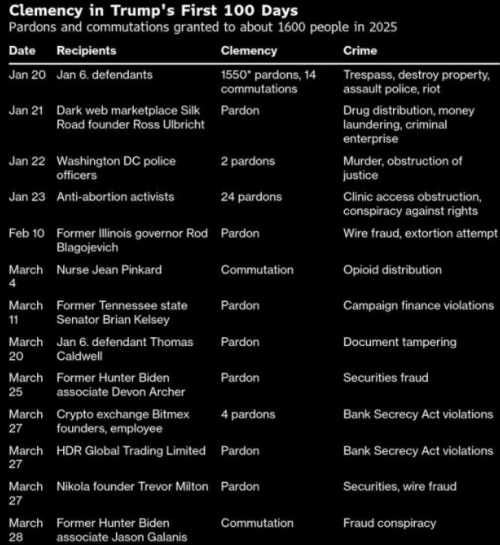Trump Makes Corruption Great Again: Pardons For Sale
Corporations are people. So the SCOTUS says. And like people, they can be pardoned too, so Trump says.
In what could be a U.S. first, President Donald Trump last week pardoned a criminal corporation, a move that largely flew under the proverbial radar amid his pardon spree for white-collar criminals including at least one of his supporters.On March 28, Trump pardoned HDR Global Trading, the owner and operator of the cryptocurrency exchange BitMEX; company co-founders Arthur Hayes, Benjamin Delo, and Samuel Reed; and former business development chief Gregory Dwyer.
The company and the four men hads each pleaded guilty to one count of violating the Bank Secrecy Act "by willfully failing to establish, implement, and maintain an adequate" anti-money laundering program, as required by law. In January, the U.S. Department of Justice sentenced BitMEX to a fine of $100 million, while the executives were sentenced to criminal probation and ordered to pay civil fines.
Trump's pardoning of white-collar criminals is not without cost to the taxpayer.
The justice department’s pardon attorney, who was recently fired, has claimed on social media that Donald Trump’s recent wave of pardoning white-collar criminals has erased more than “$1bn in debts owed by wealthy Americans” to the public purse.
The silver-lining is that that enormous sum of cash that is costing the public is being made up by Trump's personal finances.
In his second term, the president has overseen a breakdown in the traditional vetting process for deciding who gets relief and supercharged a pardon economy unlike anything seen before.Powerful people in business and finance are rushing pitches and stepping up lobbying, catering their appeals to Trump and hiring lawyers with connections to the administration. These defendants with means are spending big for a chance to clear their names, at least in official records if not in public perception. Interviews with about two dozen lawyers and pardon hopefuls, many of whom asked not to be identified discussing plans that weren’t public, have pulled back the curtain on the clemency process under Trump. Some outlined plans to spend at least tens of thousands of dollars on attorneys, lobbyists and consultants, while others say the costs will reach well north of $1 million to put cases together and get them in front of the White House.

Finally, it's hard to talk about Trump's corruption without mentioning his memecoin.
Trump is selling himself–and his meme coin—to the highest bidder. And most of those top bidders appear to be foreign, according to Bloomberg.More than 200 of the largest holders of Trump’s lucrative meme coin will be invited to attend a May 22 dinner with Trump at his golf club in Virginia. The 25 highest holders will qualify for a private reception prior to the dinner, described as a “VIP” tour. The opportunity has caused a buying frenzy, leading to the meme coin shooting up by 20 percent in value, generating even more profit for the Trump family, which has raked in more than $320 million since January.
All but six of the top 25 holders used foreign exchanges that are closed to U.S. residents. And at least 56 percent of the 220 holders used other similar offshore exchanges. This raises valid concerns about just who will have access to the president during the May 22 dinner, as the guests have only been identified by short usernames of their choosing.
Forget Russiagate, this actually is corrupt foreign influence, and it isn't even debatable.
But over the past few weeks, the Trump family’s habit of sucking real money out of their cryptocurrencies may have finally gone too far. Last Thursday, Eric Trump was in Dubai when he announced that an Emirati state-owned investment firm would invest $2 billion in the crypto exchange Binance via Trump’s latest token, a stablecoin called USD1. (A stablecoin is a cryptocurrency tied to a reserve currency like the dollar; they are pivotal to making deals with traditional financial interests that fear the volatility inherent to cryptoworld.) With this investment, the Emiratis helped provide legitimacy for the president’s untested venture while giving his company millions in fees. It also forges a direct connection between one of his companies and Binance, an exchange that settled charges of violating sanctions and anti-money-laundering laws not long ago.

